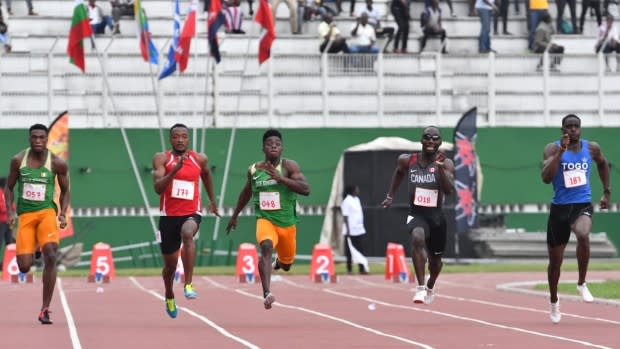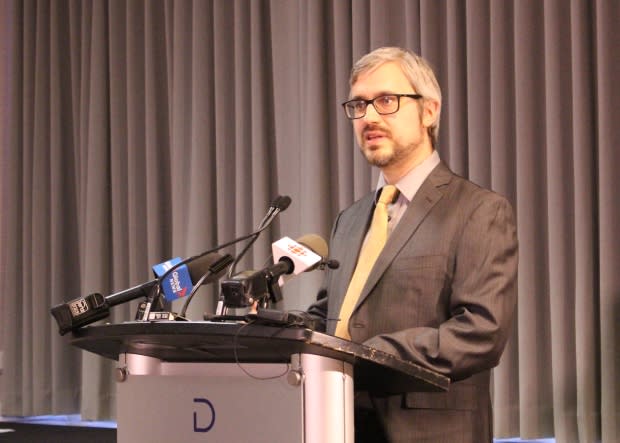2021 games business plan calls $130M event 'opportunity' to develop infrastructure
The $130-million business plan for the 2021 Francophonie Games acknowledges its budget is higher than previous games, but calls it "an opportunity" to develop sports and cultural infrastructure for the region.
The 182-page plan released by the province at 4 p.m. Friday provides a budget overview and lays out the organization of the games and the 23 sites to be used for the international event, which is expected to draw 3,000 athletes and artists.
The plan has been the subject of controversy after it was revealed it called for $130 million in spending on the games, up from the $17.5 million when the province submitted its bid three years ago.
Its release comes the day after Radio-Canada obtained an independent review of the business plan. The review calls the plan "rigorous and comprehensive" and says it found no major errors or omissions in the budget.
But the review also says the total budget could be shaved to $115 million by cutting unnecessary infrastructure spending and other costs.
The business plan, developed with help from Organisports Consultants, a firm specializing in event organization, acknowledges the budget is higher than for previous games.

While it says it would be possible to reduce budget costs, it says this could tarnish New Brunswick's reputation and reduce the large event to just a series of sports competitions without the games atmosphere.
The budget shows general spending categories, with totals (cash spending on goods and services are combined in these totals):
General: $14,167,722
Finance, administration and legal: $1,748,596
Human resources: $1,586,875
Sponsorships: $2,757,752
Ticketing and products: $54,100
Communications: $1,452,072
Media: $76,500
Events: $218,030
Peripheral events: $3,122,725
Ceremonies and Gala: $3,440,000
Programming of competitions and cultural competitions: $210,000
Other services: $2,191,153
Logistics: $4,837,835
Accommodation and food: $7,175,156
Security: $10,000,000
Site management: $698,177
Games village: $1,729,252
General services: $10,147,350
Technology: $1,741,785
Broadcasting: $8,227,193
Foundation: $4,244,116
Contingencies: $3,156,558
Taxes: $4,357,109
Infrastructure: $36,663,128
The province bid for the games in 2015 with a budget set at $17.5 million, a total copied from a host application guide from the Organisation internationale de la Francophonie.

Organizers say costs rose in part because of human resources costs, the purchase of sports equipment that provides a "significant legacy" of hosting the games; the three games villages, and the cost of food for participants that reflects the "quality and level of services" available in Canada.
It also says past budgets did not account for the in-kind value of goods and services.
The games will "contribute to a significant legacy in terms of the purchase of sports equipment and resulting in an increase in the conventional budget."

"Taking into account all the elements mentioned above, it is very clear that the conventional budget of 10 million euros (about $16 million) cannot be met to organize the event in New Brunswick according to the criteria currently imposed," the business plan states.
While officials initially told the public the "beauty" of the bid was that all the required infrastructure is in place, part of the increased cost is tied to required infrastructure.

The games are expected to start July 23, 2021, at the 9,400-seat Moncton Stadium at the University of Moncton and run 10 days, ending with a ceremony at the Avenir Centre.
The business plan calls the games an "opportunity to develop and upgrade sports and cultural infrastructure in our region."
The infrastructure projects, costing $36 million, include:
Building a training track for athletics in Dieppe that will include two synthetic soccer fields.
Upgrading the Moncton Stadium competition track, track and field warm-up areas, and throwing and jumping areas.
Adding an elevator from the ground floor to the third floor and lowering the sidewalk at the entrance to the stadium.
Buying basketball play surfaces meeting international standards and removable baskets.
Buying three dance mats that will benefit the various dance schools once the games are complete.
Building a competition arena for African wrestling and a warm-up area at the University of Moncton that would be transformed into a beach volleyball area for students after the games.
Building a synthetic soccer field with a pavilion in Moncton and two synthetic fields with a pavilion in Dieppe.
Upgrading eight tennis courts at Moncton's Centennial Park.
Creating a Village de la Francophonie at Dieppe's planned intergenerational complex
The opportunity is questioned in a federal review of the business plan carried out by MNP LLP, an independent chartered accounting firm.
The review suggests several of the organizers' proposed infrastructure projects aren't essential and could be cut to control costs.

